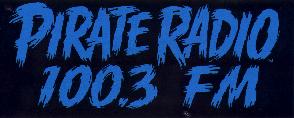Here is a photo
that appeared in Billboard Magazine. Vince
Neil and then new partner Steve Stevens met
up with the Pirate Radio Harley Girls.
On March 18, 1990,
staff and fans celebrated the Pirate's 1st
birthday with big party at The Palace.
Here's Scott Shannon live
from the Paradise Beach Club in 1990. Are we
having fun yet?!
In September, 1990,
Shadow Steele and Katie Manor were live at
the MTV Music Awards, mingling with the
stars. Shadow interviewed Riki Rachtman (of
MTV's Headbangers Ball) and Pauly Shore.
Katie had Mark Slaughter (of Slaughter) on
the air with her.
In its third year,
Pirate Radio's ratings dropped into the 2's,
and as low as 1.7 during its last year. It
was suffering from a 1980's "hair band"
image when Los Angeles was experiencing the
90's Grunge explosion, thanks to bands like
Nirvana.
So, in February, 1991,
Westwood One ended Scott Shannon's morning
show (after 699 days) and changed formats from
Rock 40 to Album Rock. Billboard reported
the changes in this article: 1
2
Early in April, 1992,
the Pirate started playing an advance copy
of Kiss's new single, "I Just Wanna", nearly
a full month before the debut single from
the band's album was due out. On the 13th of
April, PolyGram Records issued a 'Cease
& Desist' order against the station. The
song, from their upcoming new LP "Revenge",
somehow found its way onto Pirate's 'Heavy
Rotation' play list, despite the fact that
the first single, 'Unholy', was not expected
to be shipped until the first week of May.
On Christmas Day, 1992,
the station dropped the "Pirate" moniker for
a new name, "Southern California's Cutting
Edge, 100.3". Listener research indicated
that "Pirate Radio" was synonymous with what
had become cheesy 1980's pop music. Ratings
had dropped to a 2.3 in the summer ratings
book, 18th place in the market. Those
running the station wanted to take it to the
next level and felt it needed something new.
And so, the Pirate changed to an alternative
format. Tom Barnes had become involved, and
moved the station through this evolution.
The station was
formatically a year or two ahead of its
time. It was a hybrid of rock and
alternative music. The alternative format
had not yet taken over the rock world. But
KQLZ began showing signs of growth again.
And, during its last two months, it used the
"The Cutting Edge of Rock" moniker, borrowed
from 91X in San Diego. Still, the ratings
were down to a 1.4, well below expectations
in a market like Los Angeles.
Ironically, Westwood One
would have gone with the flow of the "new"
KQLZ, and it likely would have survived,
burying KLOS, outliving hard rocker KNAC,
and taking a big chunk out of KROQ. Can you
imagine where it would be today?!
But unfortunately,
Westwood One had huge corporate debt at the
time ($167.6 million) and decided to sell
some of its less profitable assets. KQLZ was
considered such at the time as was WYNY.
Viacom bought Westwood One's
KQLZ assets for $40 million, a $16 million
discount from the price Westwood One paid
just four years earlier. It was rumored that
Westwood One retained 120 minutes of ad time
per week but neither company would comment
on that. The sale of KQLZ and WYNY reduced
Westwood One's debt by $90 million. The then
recently revised FCC Rules permitted a
company to own two FM stations in the same
market for the first time, and Viacom took
advantage of the rule change in buying KQLZ.
For Westwood One, KQLZ was its last
remaining radio station. WYNY was sold three
months earlier.
Viacom, in its infinite
wisdom, viewed the station as a losing
proposition. It wanted an older, Adult
Contemporary (AC) sister for Star (KYSR
98.7). So, on Friday, April 2, 1993, it
dumped the format unceremoniously. KQLZ
became KXEZ, "EZ 100", and the entire Pirate
staff was released. Nancy Leichter, Pirate
Station Manager since the inception, was
also shown the door. The eight person sales
staff was forced to interview with KYSR's
general and local sales managers, with no
guarantee of retaining their job. KYSR had
been given the reigns, programming and
overseeing sales of KXEZ. It was the end of
KQLZ "Pirate Radio". Incredibly, Viacom
didn't even have the decency to make it a
smooth transition. At 3 pm straight up, in
the middle of a Black Crowes tune, KXEZ
signed on and told listeners to go elsewhere
for rock music. Ouch.

